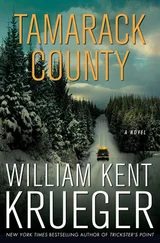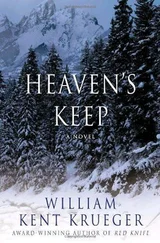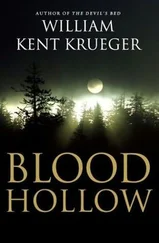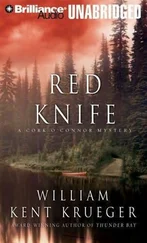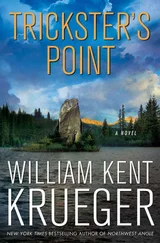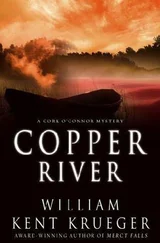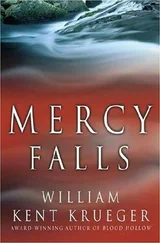William Krueger - Ordinary Grace
Здесь есть возможность читать онлайн «William Krueger - Ordinary Grace» весь текст электронной книги совершенно бесплатно (целиком полную версию без сокращений). В некоторых случаях можно слушать аудио, скачать через торрент в формате fb2 и присутствует краткое содержание. Жанр: Триллер, на английском языке. Описание произведения, (предисловие) а так же отзывы посетителей доступны на портале библиотеки ЛибКат.
- Название:Ordinary Grace
- Автор:
- Жанр:
- Год:неизвестен
- ISBN:нет данных
- Рейтинг книги:4 / 5. Голосов: 1
-
Избранное:Добавить в избранное
- Отзывы:
-
Ваша оценка:
- 80
- 1
- 2
- 3
- 4
- 5
Ordinary Grace: краткое содержание, описание и аннотация
Предлагаем к чтению аннотацию, описание, краткое содержание или предисловие (зависит от того, что написал сам автор книги «Ordinary Grace»). Если вы не нашли необходимую информацию о книге — напишите в комментариях, мы постараемся отыскать её.
Ordinary Grace — читать онлайн бесплатно полную книгу (весь текст) целиком
Ниже представлен текст книги, разбитый по страницам. Система сохранения места последней прочитанной страницы, позволяет с удобством читать онлайн бесплатно книгу «Ordinary Grace», без необходимости каждый раз заново искать на чём Вы остановились. Поставьте закладку, и сможете в любой момент перейти на страницу, на которой закончили чтение.
Интервал:
Закладка:
Lise descended the steps and started across the yard toward us.
“Frank,” Jake said pleading.
I could see the smile on Lise’s face. I could see how lightly she walked.
“Please,” Jake said.
“Warren Redstone,” I replied.
Jake looked at me, confused. “What?”
“The sheriff’s still looking for him. What if they catch up with him and he tries to run and gets himself shot? Could you live with that?”
Jake considered this and his shoulders dropped and he shook his head in defeat.
I’d lived for weeks with the belief that I’d let Ariel’s killer escape and although my father had helped me understand how to carry that burden it still weighed on me. Standing in that shaded old farmyard, I finally felt it evaporate. Warren Redstone was not a killer. He’d never done a thing to harm my family. And what I was about to do would free him too.
I put my hands out. Lise Brandt when she reached us glanced at what I held and I saw by her look that she recognized these things.
She quickly composed herself and said with a smile, “Wha tha?”
I said, “You know what they are.”
She kept smiling and shook her head.
“You killed Ariel,” I said.
She frowned dramatically. “No,” she replied and it came out like a small moan.
Jake looked up at me. “What are you going to do, Frank?”
I kept my eyes on Lise Brandt and my face toward her so that she could read my lips. “I have to tell someone. I’m going to start with Mr. Brandt.”
I left Jake sitting on the grass and walked past Lise where she stood with the tray still in her hands. I’d taken only a few steps when I heard the clatter of the tray and bottles as they hit the ground and a banshee cry at my back and Jake screaming, “Lise, no!”
I turned and saw her stoop and grasp the crowbar and charge at me, the whole time wailing like a wounded beast. She swung the bar at my head. I dodged and hit the ground and rolled and tried to get to my feet as she came again with the hard iron in her hand but I felt my ankle twist painfully and I crumpled to the grass. I lifted my arm in a feeble attempt to deflect the blow I knew was coming.
Then Jake was on her, grabbing her arm and holding fast. She screamed bloody murder and tried to shake him loose and slapped at him with her free hand.
From the porch, Emil Brandt yelled, “What’s going on?”
She turned and turned again and finally flung Jake from her and he fell to the ground. She stood over him with the crowbar raised high, breathing deeply and loud. I tried to rise but my twisted ankle prevented me from moving quickly enough. Jake just lay there looking up at her helplessly. He didn’t even lift a hand to defend himself.
And then the final miracle of that summer was delivered. Something-only God knows what-stayed the hand of Lise Brandt.
I heard breath rushing from her in and out and in. I watched paralyzed as the crowbar held still, poised high in the air. I nearly wept as she slowly lowered it and let it fall to the ground at her feet. She collapsed onto her knees facing Jake and she clasped her hands as if in prayer and droned, “Sorry. I’m sorry.”
Jake gathered himself and knelt beside her. He reached out but did not touch her. “It’s all right,” he said.
Emil Brandt hollered, “Is everything okay out there?”
Jake looked at me and I saw no child left in him at all. He said, “I’ll stay with her, Frank.”
I stood and held fast to the things that had once been Ariel’s and limping because of my injured ankle I began to make my way through the deep shadows of that August afternoon toward the porch and Emil Brandt.
Epilogue
There’s a math problem everyone is familiar with. It involves two trains. One leaves from one location, New York, for example, and the other from another location, say San Francisco. The trains are traveling toward each other at different speeds. The idea is to calculate how far each train will have traveled by the time they meet. I was never any good at math and didn’t waste time trying to solve this problem but I did spend a lot of time thinking about it. Not about how many miles the trains would have covered but about the travelers on them. Who were these people and why were they leaving New York and San Francisco and what were they seeking at the other end of the line? Most especially I wondered if they had any idea what awaited them when the two trains met. Because I thought of them as traveling on the same set of tracks, I imagined their meeting as a catastrophic collision. So it always struck me not as a math problem but rather a philosophic consideration of life, death, and unhappy circumstance.
In my own life, the two trains of this problem are the summer of 1961 and the present. And they collide every year on Memorial Day in the cemetery in New Bremen.
This year my father is waiting for me in the shade, sitting patiently on the porch of his condominium in Saint Paul, staring at the world from under the brim of a clean white ball cap. A tall man, slender all his life, he’s grown thin and fragile over the last few years, with a heart that worries us both. When I pull into the drive, he rises from the bench and hobbles to my car. He walks like a man built of toothpicks, afraid that the connections will not hold. He opens the door and eases this body, this awkward construction of brittle bone and loose flesh, into the passenger side.
“Good afternoon, sir,” he says with chipper energy, and he gives me a smile, telling me with that flash of stained enamel that he’s happy to see both me and another day.
As we head south out of the Twin Cities toward New Bremen, we talk about things that in the grand scheme matter not at all. Baseball: The Twins are playing well this year, but it’s still a long season ahead. The French Open: Who’s out, who’s still in, and why aren’t there any Americans who can play on clay? And of course the weather. In Minnesota weather tops all other topics of conversation. My father, once a voracious reader, seldom picks up a book anymore. His hands tremble, he complains, and he has trouble concentrating. He’s well over eighty. Things fall apart.
At Mankato, we turn west and follow the broad valley of the Minnesota River. It’s been a good spring, plenty of rain but not too much, and the crops have all been planted and the fields are green. My father comments on their appearance with approval, as if he has a personal stake in the harvest still far ahead. I know him and I know that it’s more than idle talk. He hopes good things for these farmers whose lives are so helplessly bound to the whim of nature. Too much rain, too little rain, a devastating hailstorm, a plague of locusts, blight, they’ve all swept through this valley like the horsemen of the Apocalypse and the only recourse for those who stand and watch the sky is prayers or curses.
A few miles outside New Bremen we grow quiet, as we always do, and our thoughts begin to slide into a consideration of the past.
It seems to me that when you look back at a life, yours or another’s, what you see is a path that weaves into and out of deep shadow. So much is lost. What we use to construct the past is what has remained in the open, a hodgepodge of fleeting glimpses. Our histories, like my father’s current body, are structures built of toothpicks. So what I recall of that last summer in New Bremen is a construct both of what stands in the light and what I imagine in the dark where I cannot see.
Entering town we drive a new road across a recently built bridge spanning the river. Only a hundred yards east stands the trestle that is one of the solid fixtures of both past and present. The grain elevators along the tracks are gone but I can see down Tyler Street all the way to the Flats. The church, remodeled and enlarged over the years, is still there and in late afternoon the shadow of the steeple still falls across the house where the Drums once lived.
Читать дальшеИнтервал:
Закладка:
Похожие книги на «Ordinary Grace»
Представляем Вашему вниманию похожие книги на «Ordinary Grace» списком для выбора. Мы отобрали схожую по названию и смыслу литературу в надежде предоставить читателям больше вариантов отыскать новые, интересные, ещё непрочитанные произведения.
Обсуждение, отзывы о книге «Ordinary Grace» и просто собственные мнения читателей. Оставьте ваши комментарии, напишите, что Вы думаете о произведении, его смысле или главных героях. Укажите что конкретно понравилось, а что нет, и почему Вы так считаете.


